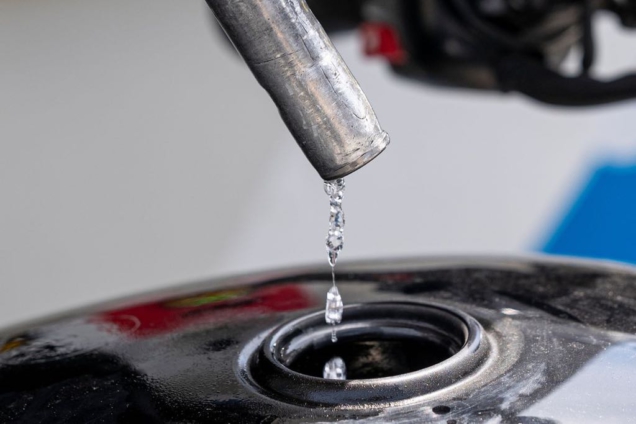Economist, Dr. Theo Acheampong, says finding cheaper and ‘reliable’ sources of fuel for the country might not bring the relief government is hoping to bring to Ghanaians.
According to him, the major factors contributing to the fuel price hikes are the rapidly depreciating cedi, the currency’s poor performance on the exchange rate and the taxes on fuel products in the country, rather than reliable supply.
He noted that while government may be attempting to find cheap sources of oil, their endeavor is a much tougher task than they communicate to the public.
Speaking on JoyNews’ Newsfile, he said, “In the current market that we are in, is it really the case that we have issues of reliability of supply of petroleum products and that they’re not coming in at a regular interval? I don’t think that is the case because the market is fairly deregulated.
“BDCs bring it in and sell it on to the OMCs and within that they’ll take into account the factors that I’ve talked about. So unless the government is saying that they’re going to negotiate some of the importation that comes in with their external partners and be able to get a relatively cheaper price.
“So let’s stick with the crude oil price today, $96 a barrel. If the government could negotiate with their counterparts and get it to $90 a barrel then you’re addressing one strand of those three things that drive the price and that could bring things down.”
He continued, “But would they actually get that? That’s the really important thing here. Who would be willing to sell to the government at a discount and what sort of financial arrangement would underpin it.”
Dr. Theo Acheampong advised that a more sustainable solution to the problem is to reduce the taxes and margins on petroleum products.
This he says would have immediate effects at the pump rather than the importation of cheap fuel which may not even lead to a significant reduction in the price of fuel at the pumps.
“In all of this there’s also one thing we haven’t talked about, that many people are saying look, bring down some of the taxes and the margins and the levies and that would actually offer a much bigger immediate benefit to Ghanaians at the pump than us running around all over the place looking for ‘reliable’ and regular supply when actually the issue is not reliability or how regular it is. It is that the depreciation of the exchange rate is what is driving prices at the pump. That is the big issue,” he said.
Government officials are currently in the United Arab Emirates engaging leaders in the oil industry for cheaper supply of fuel.
According to Dr. Acheampong, even if they government finds cheaper sources of fuel, other secondary factors such as the transportation of the fuel to the country among others would ultimately hike the prices again thus causing no change at the pump.
“I am not too sure even if they got some volumes it will really be enough to bring down that 18 cedi per litre at the pump. Because if you break down the price, the biggest thing is the cedi, it’s the exchange rate and it’s the taxes. That is the thing that we need to address.”
Latest Stories
-
Actress Benyiwaa of ‘Efiewura’ TV series dead
15 minutes -
Ashanti Regional Chief Imam dies at age 74
39 minutes -
Africa Arts Network calls for tax reform to save Ghana’s theatre industry
52 minutes -
SSTN Ghana Chapter reaffirms commitment to economic growth under new leadership
58 minutes -
Inlaks strengthens leadership team with key appointments to drive growth across sub-Saharan Africa
2 hours -
Green Financing: What Ghana’s Eco-startups need to know
2 hours -
CHAN Qualifiers: Amoah confident of beating Nigeria
2 hours -
Governments deprioritising health spending – WHO
2 hours -
Lordina Foundation brings Christmas joy to orphans
2 hours -
Yvonne Chaka Chaka to headline ‘The African Festival’ this December
2 hours -
Nigerian man promised pardon after 10 years on death row for stealing hens
2 hours -
MGA Foundation deepens support for Potter’s Village
3 hours -
Galamsey: One dead, 3 injured as pit collapses at Nkonteng
3 hours -
Man, 54, charged for beating wife to death with iron rod
3 hours -
MedDropBox donates to UG Medical Centre
3 hours

